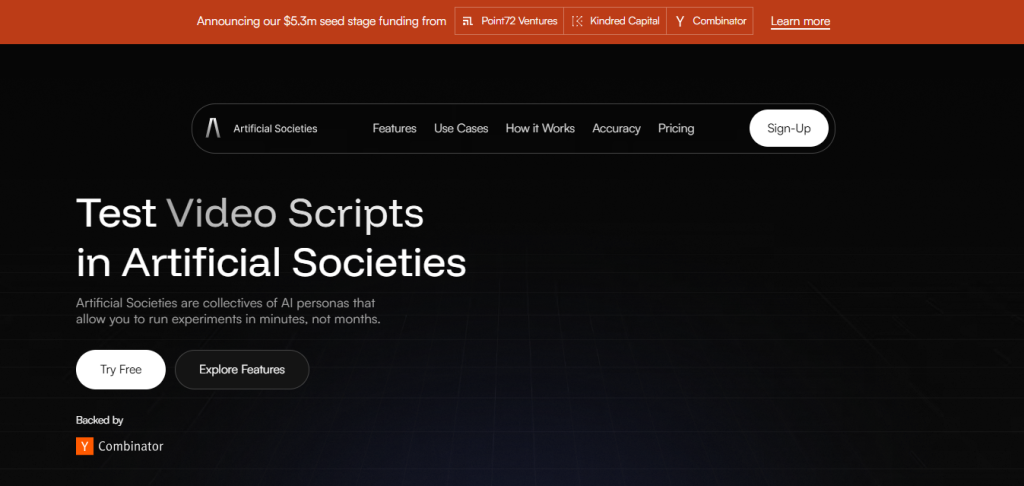Artificial Societies Raises $5.35 Million to Build the Future of Autonomous AI Agents
August 31, 2025
byFenoms Startup Research

The future of artificial intelligence is moving beyond chatbots and predictive models. The next frontier is autonomous AI agents - systems that can collaborate, negotiate, and make decisions independently within dynamic environments. Artificial Societies, a pioneering startup in this space, has just raised $5,350,000 in Seed funding to accelerate the development of AI agents that mimic human social behavior at scale.
The funding round was led by Point72 Ventures with participation from angel investors, reflecting strong conviction that Artificial Societies’ work will reshape how AI is applied across industries. Co-founded by James He and his team, the company is building a platform that blends simulation, generative models, and social dynamics to create more life-like, decision-capable AI agents.
Building AI That Behaves More Like Us
Most AI systems today operate in isolation - powerful but narrowly focused. The challenge is that real-world problems often require cooperation, negotiation, and adaptive learning. Artificial Societies is tackling this by training AI agents not as standalone models, but as participants in ecosystems.
Think of AI agents that can represent consumers in online marketplaces, test policies in simulated environments, or model entire populations to forecast economic and social outcomes. This is the promise of Artificial Societies: a platform where thousands of agents can interact, evolve, and generate insights far richer than traditional analytics.
According to Gartner, by 2030, 80% of enterprise applications will include AI agents capable of acting autonomously - a shift that could redefine productivity, governance, and customer engagement. Artificial Societies is positioning itself at the forefront of this transformation.
And this is where the deeper founder insight emerges: the real breakthrough isn’t intelligence - it’s interaction. Too many startups chase smarter algorithms without realizing that markets themselves are ecosystems. Customers, regulators, and competitors constantly interact, shaping outcomes in ways no single model can predict. Artificial Societies shows that designing for the system, not the silo, creates a multiplier effect. For founders, the lesson is clear - stop asking only whether your product works, start asking how it behaves once it enters an ecosystem. Products that spark compounding interactions, like network effects in social platforms or liquidity loops in marketplaces, build moats that no algorithm alone can secure.
Why This Funding Matters
AI agent-based systems are emerging as a critical piece of the next generation of AI. The global AI market is projected to reach $1.3 trillion by 2032 (Statista), with autonomous agents expected to be one of the fastest-growing verticals. From supply chain optimization to financial trading, the ability to simulate and coordinate complex behavior is in high demand.
Artificial Societies differentiates itself by focusing on scalability and realism. Their platform isn’t just building agents in isolation; it’s designing societies of agents that adapt and learn from each other. This opens up applications in:
- Economic modeling – Testing financial or policy outcomes before they’re implemented.
- Enterprise operations – Automating negotiations, scheduling, and resource allocation.
- Virtual worlds & gaming – Populating immersive environments with life-like, responsive AI characters.
Who’s Backing Artificial Societies
The backing of Point72 Ventures brings both capital and credibility. The firm has a strong track record in identifying frontier technologies early, with investments across AI, fintech, and enterprise software.
Angel investors in this round add another layer of expertise, likely offering not just funding but guidance on commercialization, partnerships, and scaling AI responsibly. The combination of institutional and individual backers positions Artificial Societies with the resources to grow strategically while maintaining agility.
Market Outlook: The Age of AI Agents
The adoption of AI agents is accelerating faster than most anticipated. According to Forrester Research, over 40% of enterprises are already experimenting with autonomous agents in customer service, trading, or internal automation. That number is expected to double in the next three years.
Other industry signals include:
- AI in simulations and digital twins is projected to hit $48 billion by 2030, fueled by demand in manufacturing, logistics, and urban planning.
- Virtual economy participation is expanding, with AI agents increasingly being used to stress-test financial systems and forecast demand.
- Gaming and entertainment are integrating agent-based models to create more dynamic, unscripted interactions, a market worth $300 billion globally (PwC).
Artificial Societies is entering at the right time, with a differentiated platform that can serve multiple high-growth industries simultaneously.
What’s Next for Artificial Societies
With its new $5.35 million seed round, Artificial Societies plans to:
- Expand its engineering and research teams to advance simulation complexity.
- Build partnerships with enterprises in finance, logistics, and policy modeling.
- Develop APIs and tools to make agent-based simulations accessible to developers.
- Strengthen its infrastructure to scale large simulations with thousands of agents.
The company’s long-term vision is to build AI ecosystems that act as testing grounds for the real world - where businesses, governments, and developers can safely experiment, predict, and optimize outcomes before they happen.
Final Take
Artificial Societies’ $5.35 million raise is more than just a funding milestone - it’s a glimpse into the future of AI. By designing systems of agents that interact like societies, the company is creating a new paradigm for intelligence at scale.
For founders, the lesson is as strategic as it is simple: don’t just build smarter tools - build tools that thrive in systems. The future belongs to products that amplify interaction, reduce friction, and generate compounding value the more they’re used. Artificial Societies is already on that path, and investors are betting it could lead the way into the age of autonomous AI agents.









